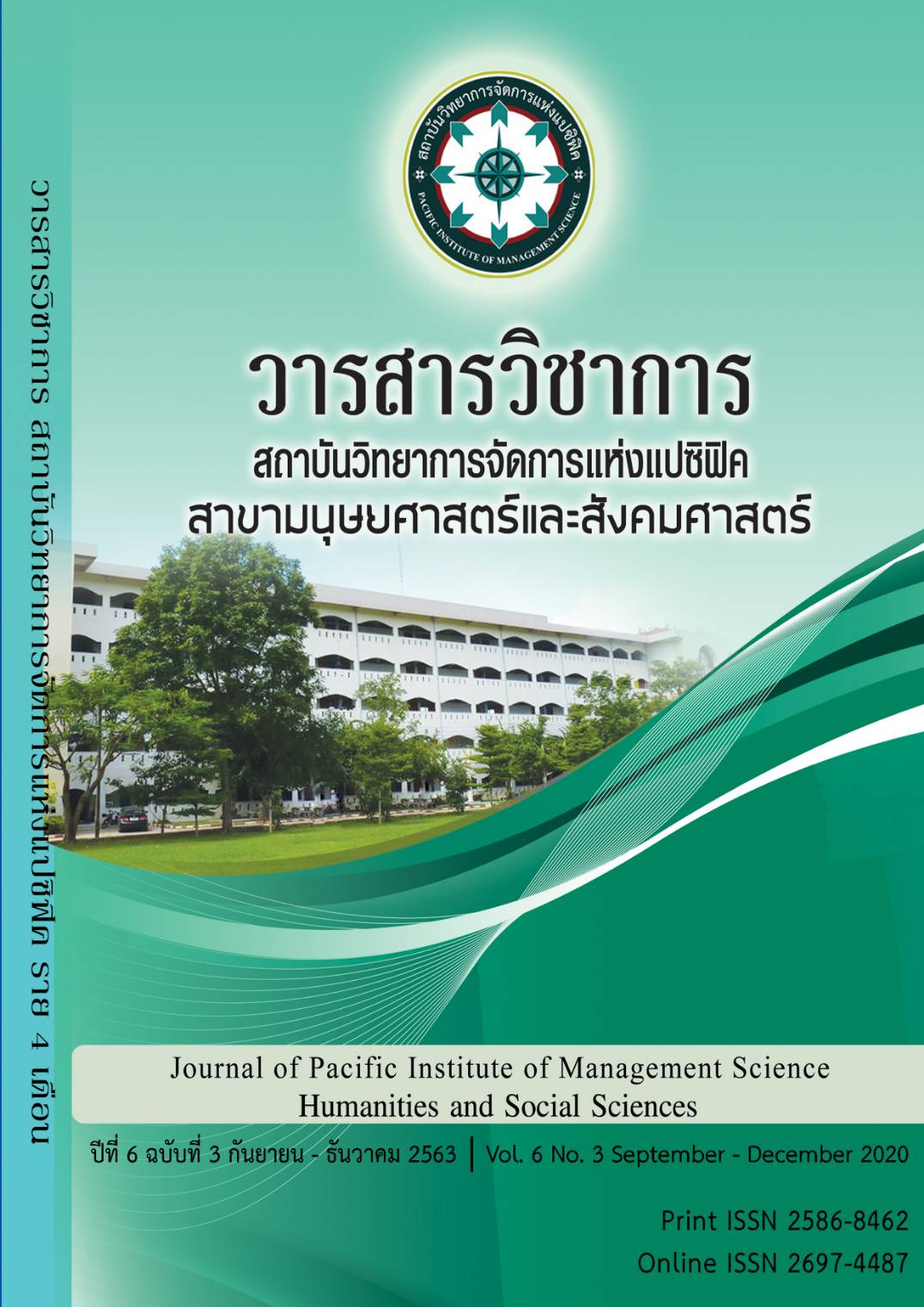Application of su-ji-pu-li in Thai society in the current situation
Keywords:
Sujipuli, Application, Thai SocietyAbstract
This Review article covers two issues of application of Su-ji-pu-li in Thai society. And its application for teachers / teachers to teach By using surveys, paperwork, articles and research Discussion of the application of Su-ji-pu-li using synthesis and analysis collected from relevant documents. The results of this study found that The application in learning, reading, thinking and writing in the heart of Su-ji-pu-li is presented by teachers. See from the textbook Listening to the lecture is listening to thinking and bringing the four main powers to support learning. Until being able to apply that knowledge to professional and everyday life. To be a sage or a sage, you need to study, think, inquire, know, and memorize. Which our country lacks these qualities Thus making our country lack of knowledge in many disciplines Application section for teachers / professors to teach. Found that the important process of learning In Buddhism, the principle of Sujipuli is applied, it must include 1) Principles, concepts and theories of participatory classroom action research based on the Sujipuli approach 2) components of the training package 3) Elements of action research with Participate in the classroom according to the Sujipuli Guidelines 4) CIPP Assessment Model Certification Evaluation Results from Course Instructional Professional That must be applied by looking at the context of the course types of educational institutes And group of learners The choice of application method must be suitable for people, time and place.
References
มหาอุดร อุตฺตโร (มากดี), (2557)รูปแบบแห่งการจัดการการเรียนรู้ตามหลักพุทธธรรม,วารสารครุศาสตร์ปริทรรศน์
ปีที่ 1 ฉบับที่ 2 กันยายน-ธันวาคม 2557 , หน้า 171-187
มัณฑรา ธรรมบุศย์.(2548).ลีลาการเรียนรู้.แหล่งที่มาhttp://edu.chandra.ac.th/teacherAll/,mdra/data
/learnstyle.doc. 19 กันยายน 2552
ปานรวี ยงยุทธ์วิชัย ( 2548)การอ่าน เขียน คิดวิเคราะห์คิดสังเคราะห์. กรุงเทพฯ: สถาบันส่งเสริมและพัฒนาการ
อ่านการเขียนแห่งประเทศ
ปทุมมาศ รักษ์วงศ, มนต์ชัย เทียนทอง, และ ชัยวิชิต เชียรชนะ (2561)การพัฒนารูปแบบการฝึกอบรมครูสำหรับ
ทำวิจัยเชิงปฏิบัติการแบบมีส่วนร่วมในชั้นเรียนตามแนวทางสุ จิ ปุ ลิ, วารสารวิชาการครุศาสตร์
อุตสาหกรรม พระจอมเกล้าพระนครเหนือปีที่ 9 ฉบับที่ 3 กันยายน – ธันวาคม 2561, หน้า 94-102
พระเจตน์สฤษฎ์ อินทร์จันทร, (2555)ผลการเรียนแบบอีเลิร์นนิง ด้วยกิจกรรมการเรียนรู้แบบ สุ จิ ปุ ลิ ที่มีต่อ
ความสามารถในการเรียนของนักเรียนนักธรรมชั้นโท, Veridian E-Journal,SU กลุ่มมนุษยศาสตร์และสังคมศาสตร์ Vol.5 No. 1 January – April 2012 , หน้า 693-709
พระธรรมกิตติวงศ์(ทองดี สุรเตโช) ป.ธ. 9.(2548) พจนานุกรมเพื่อการศึกษาพุทธศาสน์ ชุด คำวัด.วัดราชโอรสาราม กรุงเทพ.
พระยาอุปกิตศิลปสาร (2546)หลักภาษาไทย (อักขรวิธี วจีวิภาค วากยสัมพันธ์ ฉันทลักษณ์). กรุงเทพฯ: ไทยวัฒนา
พานิชย์.
พาฝัน ธนากูรเมธา,(2560)ทักษะการสอนภาษาอังกฤษในศตวรรษที่ 21 โดยใชหลัก สุ.จิ.ปุ.ลิ, วารสารสิรินธร
ปริทรรศน์ ปีที่ 18 ฉบับที่ 1 (2017): มกราคม-มิถุนายน 2560, หน้า 26-34
สรญา เปรี้ยวประสิทธิ์(2563)แบบจำลองระบบการสอนดิจิทัลออนไลน์เลิร์นนิงบนสภาพแวดล้อมคลาวด์เอ็ด
ดูเคชั่นด้วยกระบวนการสากัจฉา ผ่านการเรียนรู้ของผู้เรียนด้วยวิธีสุจิปุลิ,วารสารเทคโนโลยีสื่อสารมวลชน มทร.พระนคร : ปีที่ 5 ฉบับที่ 1 (มกราคม-มิถุนายน 2563) หน้า 19-26
Kemmis, S.,& McTaggart, R. (1988). The action research planner. 3th ed. Geelong, Australia :
Deakin University Press.
Vimolchaya Yanasugondha(2013).Promoting a Learner-Centeredness Classroom by Adopting the
Su Ji Pu Li Principle into CALL for Thailand Tertiary Level Students, Vol. 16 No. 3 (2013): Special Issue, 119-125
Downloads
Published
Issue
Section
License
บทความที่ได้รับการตีพิมพ์เป็นลิขสิทธิ์ของ สถาบันวิทยาการจัดการแห่งแปซิฟิค
ข้อความที่ปรากฏในบทความแต่ละเรื่องในวารสารวิชาการเล่มนี้เป็นความคิดเห็นส่วนตัวของผู้เขียนแต่ละท่านไม่เกี่ยวข้องกับสถาบันวิทยาการจัดการแห่งแปซิฟิค และคณาจารย์ท่านอื่นๆในสถาบันฯ แต่อย่างใด ความรับผิดชอบองค์ประกอบทั้งหมดของบทความแต่ละเรื่องเป็นของผู้เขียนแต่ละท่าน หากมีความผิดพลาดใดๆ ผู้เขียนแต่ละท่านจะรับผิดชอบบทความของตนเองแต่ผู้เดียว







